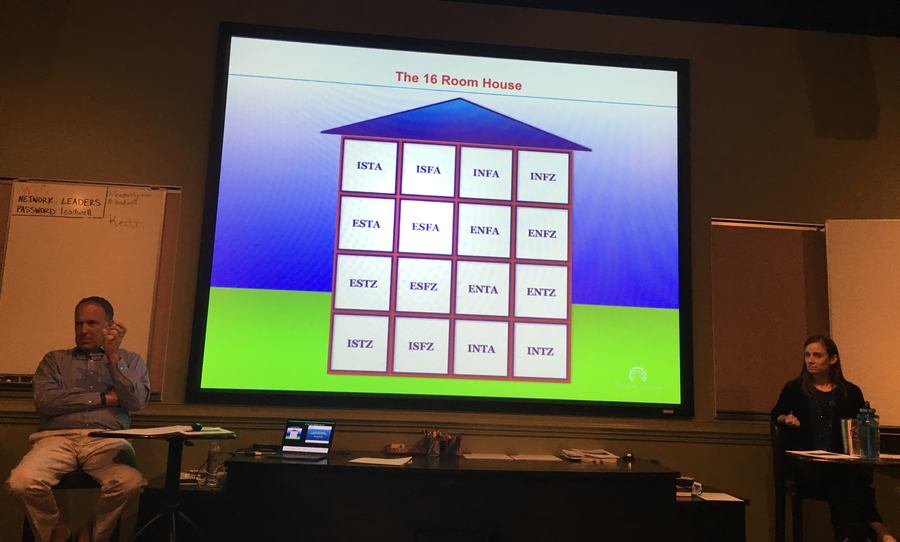
Written by Jason Montoya on . Posted in My Leaders Lyceum Experience.
What Is Personality Testing & How Does It Affect Our Behavior?
This post is part 4 of My Leaders Lyceum Experience blog series. I'm writing in exchange for the opportunity to go through the multi-corporate program.
When we understand how our personality affects us and others, we better lead ourselves and those who follow. We can also learn to more effectively lead our families and community. So, according to personality testing, who am I?
At the offset of my second session, the facilitator, and founder of the Leaders Lyceum, Dr. Keith Eigel demonstrated to the group how our personality type can predict general behavioral approaches to problem-solving. His demonstration included a writing activity. In the front of the room, Keith simply stated the word LEAF.

With no further direction, we were told to write about this word for seven minutes. For some people, this was a blank slate to get creative while others asked unanswered clarifying questions. Everyone spent the following seven minutes writing from this one-word instruction.
The Four Commonly Used Quadrants Of Personality Testing
Let me stop a moment to provide a high-level breakdown of personality, as taught by the Leaders Lyceum. The given personality test is powered by Jung’s Theory of Type as well as the Five Factor Model of Personality from the Golden Personality Type Profiler™. This personality test identifies both a 4-letter Jungian type and a 5th element for stress while offering I8 sub-facets that describe the unique personality of each individual. If you've heard of, or taken, Myers Briggs, it's similar.
The four main areas of personality are driven by these four questions.
Where do we draw our energy? The source of our energy can come from the outer world of people, places and things (Extroversion) or from the inner world of thoughts and ideas (Introversion)?
How do we process information? Sensors leverage detailed and literal data gathered from their five senses. Intuitives discover high-level information leveraging their "sixth sense".
How do we make decisions? Those who organize and act in a logical and objective way are Thinkers. Feelers make decisions based on personal values.
How do we approach life? Organizers obviously prefer living a planned and organized life. Adapters live a life of spontaneity and flexibility.
There are four main commonly used groupings of these personality elements.
- SA (Efficient & resourceful)
- NF (Imaginative & Innovative)
- SZ (Responsible & Reliable)
- NT (Competent & Visionary).
The Leaders Lyceum uses a slightly different quadrant for organizing personality types.
How The Leaders Lyceum Alters These Personality Function Pairs
The Leaders Lyceum has a slight variation to what is commonly used in the personality testing industry. When you take away the first and last letters (E/I and Z/A), you're left with S/N and T/F. The Leaders Lyceum groups these in what they call function pairs. This determines how someone takes in information and decides on that information. While they maintain NF and NT, they change the others to ST and SF so the groups are all determined by their middle pair of letters. Here is how they've grouped them and what each personality group values.
- ST (Sensing Thinkers) - The Analysts value what their senses experience that can be turned into objective reality.
- SF (Sensing Feelers) - The Helpers value life experiences matter-of-factly and turn to those experiences to develop personal, practical, and people oriented guidelines.
- NF (iNtuitive Feelers) - The Idealists value unique, subtle, personal, and ambiguous features of their experience.
- NT (iNtuitive Thinkers) - The Strategists value ideas that can be turned into conceptual mental models or blueprints.

If you mentally break up the personality house, as seen above, into four quadrants using the grouping I've justed list, you'll see I live in the top right area of the house as an NF (Idealist/Competent & Visionary). I'll dive into the details in the next post, but first I'll share what I wrote as an NF for the LEAF exercise mentioned above.
What An NF Wrote For The LEAF Exercise
"LEAF stands for Leadership Excellence After Failure. None of us can avoid or prevent failure in our journey. So, the question is not about whether or not we will fail, but how will we respond after we fail? It could be a failed project or a moral failure. These failures can have a significant meaning and affect us or they could mean very little. Some failures may not affect us but they can significantly affect others.
Knowing we're going to fail small or big, it's useful for us to know & plan for how we'll respond after the failure. Will we embrace it, learn from it, and mature? Will we avoid it, run away or self-destruct? This is where LEAF (Leadership Excellence After Failure) comes into play. It reminds us of the vision, the ideal way we'll handle these failures. So what's your story of failure? What's your LEAF story?"
As an NF, I'm likely to turn this type of exercise into a creative endeavor that branches out into a more abstract story, as you see above. While in the session, someone from each of the four main quadrants shared their story and we were able to experience firsthand the differences between each section of the house. We had a lot of laughs and light-bulbs as we learned to better understand how we think, process and apply information.
What was most helpful for me during this segment of the day was getting a deeper understanding of how the four areas of personality are driven and having it infused with first-hand accounts of these variations. While I was aware of many of these elements at a broad level, I've received a deeper understanding of how this works. It inspired me to more intentionally pull team personality insights into my work.
In my next post, I'll share my personality results and the issue I had with it.
Related Content
Have You Taken A Personality Test To Help You Better Understand Yourself?
September 04, 2017
The World Ain't All Sunshine & Rainbows ft. Rocky Balboa
September 07, 2017
What's It Like On The Other Side Of You?
September 22, 2017
Last Updated: August 24, 2017


